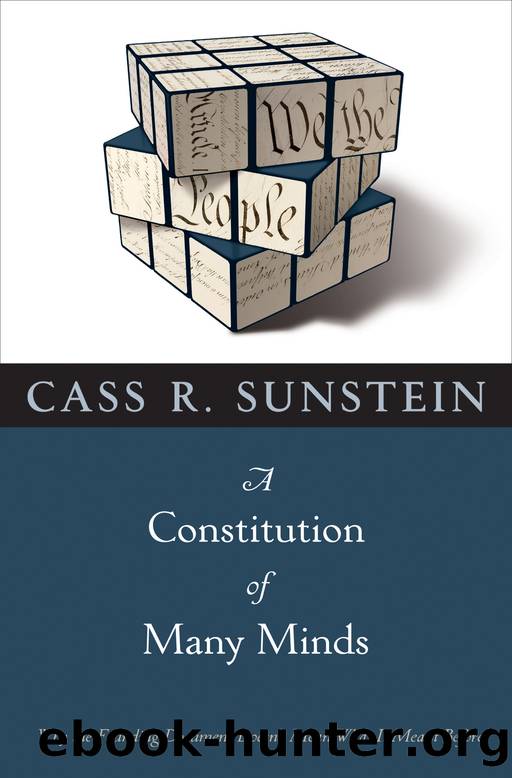A Constitution of Many Minds by Cass R. Sunstein

Author:Cass R. Sunstein [Sunstein, Cass R.]
Language: eng
Format: epub
ISBN: 9781400829927
Published: 2009-07-14T16:00:00+00:00
TRADITIONALISM AS A SECOND-BEST SOLUTION
There are other grounds for due process traditionalism. Most obviously, the effort to root substantive due process in long-standing practices might operate as a second-best substitute for another, preferable approach.
First-Best, Second-Best
Many people believe that the due process clause is purely procedural and that the whole idea of substantive due process is unrooted in the text of the Constitution.42 The simple idea here is that the text says that governments may not deprive people of âlife, liberty, or property, without due process of law.â These words seem to suggest that if governments are to deprive people of life, liberty, or property, they must provide a fair hearing (âdue process of lawâ). It follows that if government is going to lock you up or take your property, or for that matter execute you (âlifeâ), it cannot do so without some kind of procedure.
To say the least, this is an extremely important safeguard. But it is a limited one. So long as the government has provided you with a fair procedure, it can do as it wishes. On this reading, the government is permitted to ban contraceptives, to forbid people to have abortions, to stop grandparents from living with their grandchildren, to require people to become sterilized. Nothing in the due process clause suggests âsubstantive,â as opposed to procedural, protection of liberty.
On this understanding of the text, the best approach would be to abandon substantive due process altogether. But for those who care about precedent, it would seem too late in the day to take that approach, which would challenge not merely the Courtâs most controversial exercises in substantive due process,43 but also a range of decisions that are firmly entrenched in constitutional law.44 If those decisions are taken as given, due process traditionalism might be seen to be a second-best substitute for the complete abandonment of substantive due process. Here is the crucial point: With due process traditionalism, it should be possible to prevent other ventures in substantive due process while also preserving a great deal of existing law.
There is a second view for which due process traditionalism might be a second-best substitute. Recall the position associated with James Bradley Thayer, which asks judges to defer to any plausible understanding of the Constitution.45 Whether or not Thayerism makes sense in general, perhaps it makes sense in the domain of substantive due process in particular, above all because of the difficulty in giving principled content to the idea of âliberty.â It should be easy to see how due process traditionalism might be a second-best substitute for a Thayerian approach to the Constitution.
Suppose that judges believe that very few legislative decisions will actually violate long-standing understandings of rights, and that most people, invoking the due process clause, will be attempting not to vindicate traditions but to create new rights grounded in their own theory of what people should be able to doâas, for example, in Washington v. Glucksberg (physician-assisted suicide), Roe v. Wade (abortion), and Lawrence v. Texas (same-sex sexual relations).
Download
This site does not store any files on its server. We only index and link to content provided by other sites. Please contact the content providers to delete copyright contents if any and email us, we'll remove relevant links or contents immediately.
The Secret History by Donna Tartt(19083)
The Social Justice Warrior Handbook by Lisa De Pasquale(12190)
Thirteen Reasons Why by Jay Asher(8907)
This Is How You Lose Her by Junot Diaz(6885)
Weapons of Math Destruction by Cathy O'Neil(6279)
Zero to One by Peter Thiel(5798)
Beartown by Fredrik Backman(5751)
The Myth of the Strong Leader by Archie Brown(5507)
The Fire Next Time by James Baldwin(5441)
How Democracies Die by Steven Levitsky & Daniel Ziblatt(5218)
Promise Me, Dad by Joe Biden(5153)
Stone's Rules by Roger Stone(5087)
A Higher Loyalty: Truth, Lies, and Leadership by James Comey(4959)
100 Deadly Skills by Clint Emerson(4924)
Rise and Kill First by Ronen Bergman(4788)
Secrecy World by Jake Bernstein(4751)
The David Icke Guide to the Global Conspiracy (and how to end it) by David Icke(4717)
The Farm by Tom Rob Smith(4506)
The Doomsday Machine by Daniel Ellsberg(4489)
